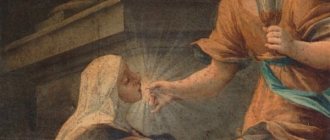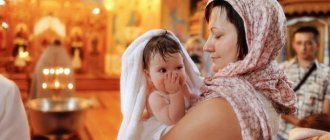The meaning of the name Vitaly
The name Vitaly, like many others, came to us from ancient Rome, as a derivative of Vitalis, which means “vital” in Latin. This male name is found in the calendar of commemoration of saints in both the Catholic and Orthodox churches.
In medieval Rus' it appeared along with the arrival and spread of Christianity. Different peoples have different forms of the name, but they are all similar and recognizable, since the basis remains the same. In Slavic languages, there is also a feminine form of the name - Vitalina.
Characteristics of the name Vitaly
Men with this name are most often calm and self-confident. In childhood, they are distinguished by their gentle character and obedience. As a rule, Vitalys are very attached to their mothers, and this connection does not weaken with age, but grows from affection into love and deep respect.
The name Vitaly endows its owner with romanticism and makes him a dreamer. This is especially evident in adolescence. But he keeps his inner world deep within himself. Because of Vitalia’s soft character, she takes grievances very hard and takes everything to heart. They have few friends; as a rule, they are younger in age.
In his adult life, Vitaly is an irreconcilable debater; he will stand to the end if he is confident that he is right. Temperamental and emotional, it is not always easy with him. Childhood shyness and gentleness remained in distant childhood, this is a real man with his own opinion, to whom it is difficult to impose someone else’s.
Like others, the Vitalys have their own family, which has special meaning for them. The owners of this name do not know how to love halfway; they give themselves entirely to it. They are amorous, this happens very often. But they cannot dwell on the past for too long, so they easily find a replacement and move on.
The qualities that characterize men with this name endow them with a character trait that determines a lot in his life and behavior - disgust. It is thanks to her that Vitaly is very picky about dating.
Saint Vitaly the Roman
The holy martyr Vitaly the Roman lived in the 2nd century AD. He had six brothers. Their mother, the wealthy Roman matron Felizata, was a Christian. She also raised her children in the Christian faith, taking them with her to secret meetings and prayers of the community from childhood. For spreading the faith, Felitsata was captured and tried to force her to renounce Christ.
But she was firm, and then her sons were tortured. And they were strong in faith, despite the cruel torture. Unable to achieve their goal, the executioners killed their sons, and then Felitsata herself. The family of the holy martyrs rests in the same place where they met their death - in Rome. Their relics were transferred to the Church of St. Susanna. Memory of St. Vitaly the Roman is celebrated in Orthodoxy on February 7th.
When is Vitaly’s name day?
The name was included in the church calendar during the period of early Christianity.
In the second century, the martyr Vitaly the Roman, together with his family, suffered martyrdom for the faith; he is commemorated on February 7.
In the 7th century there lived the saint Vitaly of Alexandria, who distributed the Scriptures and called people to faith. The church commemorates him on May 5, and Vitaly of Kerkyra is also commemorated on May 11.
On one of these days, name days are celebrated by Vitaly, those born on these days, as well as those who were given this name at baptism and who are patronized by one of the above-mentioned saints.
Saint Vitaly of Alexandria
The Monk Vitaly of Alexandria lived almost his entire life in Palestine, in the monastery of St. Serida, serving as a monk. At the age of 60, he left the monastery and went to Alexandria. Seeing the abundance of sin, he decided to overcome it with prayer and conviction.
During the day he worked hard, receiving 12 coppers for his work. In the evening, he bought some food with one coin, and gave the rest to one of the Alexandrian harlots, staying with her until the morning. He paid money so that the unfortunate woman would not sin at least that night.
Until the morning he prayed and called on the lost one to return to a righteous life, and when leaving, he made her promise not to tell anyone about what really happened. The next day, St. Vitaly worked again, and at night he went to the next harlot.
The persistence of requests and diligence in prayer were not in vain. Many harlots gave up their trade. And some even went to the monastery. But still, rumors spread throughout the city that monk Vitaly was committing adultery instead of obedience.
The inhabitants of Alexandria began to mock him; many, when they saw him, scolded and reviled him. In response, he only urged not to judge others and to take care of the purity of one’s thoughts and actions. Some townspeople could not stand it and complained to the patriarch about the shameless monk. But he did not believe such words, and also shamed the slanderers.
One morning, when St. Vitaly was leaving one of the sinners when he met a young man seeking pleasure. Seeing the monk, he, like everyone else, began to insult him and hit him on the cheek. In response, he only heard that he would soon receive such a blow that many people would come running to his screams.
Venerable himself Vitaly returned to his cell, where he went to the Lord for prayer. And then a demon approached the young man, hit him in the face and said that this was a message from a monk. The young man began to rage, tearing his clothes and screaming so that many townspeople came running. Having recovered a little, he rushed to the saint’s cell to beg for forgiveness, and the townspeople followed him.
And so they found the deceased St. Vitaly bowed in prayer. Now free from the oath, the former sinners told people about the true service of St. Vitaly, and they were ashamed. And the most holy patriarch with his assistants himself carried the monk’s body through the entire city and interred it with prayers. Memory of St. Vitaliy of Alexandria is celebrated on May 5th.
Venerable Vitaly of Alexandria
The Monk Vitaly, a monk of the monastery of the Monk Serida, came to Alexandria under St. John the Merciful (November 12), Patriarch of Alexandria (609–620).
The saint, having reached old age (he was 60 years old), dared to undertake an extraordinary feat: he wrote down all the harlots of Alexandria in his memorial and began to pray fervently for them. The monk worked from morning to evening and earned 12 copper coins every day. In the evening, the saint bought himself one bean, which he ate no earlier than sunset. He gave the rest of the money to one of the harlots, to whom he came at night and said: “I beg you, for this money, keep yourself pure this night, do not sin with anyone.” Then the monk locked himself with the harlot in her room, and while the harlot slept, the elder prayed all night, reading psalms, and in the morning he quietly left her. And so he did every day, visiting all the harlots in turn, and he took an oath from them that they would keep the purpose of his visits secret. The inhabitants of Alexandria, not knowing the truth, were indignant at the monk’s behavior, insulted him in every possible way, but he humbly endured all the ridicule and only asked not to judge others.
The holy prayers of St. Vitaly saved many fallen women. Some of them went to monasteries, others got married, and others began to work honestly. But they were afraid to tell about the reason for their correction and thereby remove the charges from the Monk Vitaly - they were bound by the oath taken by the saint. When one of the women violated her and began to justify the monk, she fell into a demon. After this, the Alexandrians did not doubt the sinfulness of the saint.
Some clergy, seduced by the monk’s behavior, reported him to the holy Patriarch John the Merciful. But he did not believe the informers and said: “Stop judging, especially the monks. Don't you know what happened at the First Council of Nicaea? Some of the bishops and clergy brought written denunciations against each other of blessed memory to Tsar Constantine the Great. He ordered a lighted candle to be brought and, without even reading the scriptures, he burned them and said: “If I saw with my own eyes a bishop, or a priest, or a monk sinning, I would cover him with my clothes so that no one would see his sin.” Thus the wise saint shamed the slanderers.
The Monk Vitaly continued his difficult feat: appearing before people as a sinner and fornicator, he led the lost to repentance.
One day, leaving the fornication, the monk met a young man walking there - a fornicator, who struck him on the cheek with abuse and shouted that the monk was disgracing the name of Christ. The monk answered him: “Believe me, for me, the humble one, you will receive such a blow on the cheek that all of Alexandria will come running to your cry.”
After some time, the Monk Vitaly settled in a small cell and died in it at night. At the same hour, a terrible demon appeared in front of the young man who had hit the elder, hit him on the cheek and shouted: “Here is a blow for you from the monk Vitaly.” The young man began to rage. He rolled on the ground in a frenzy, tore his clothes and shouted so loudly that he gathered a crowd of people.
When a few hours later the young man came to his senses, he ran to the saint’s cell, crying out: “Have mercy on me, servant of God, that I have sinned against you.” At the door of the cell, he finally came to his senses and told those gathered about his meeting with the Monk Vitaly. Then the young man knocked on the door of the cell, but received no answer. When the door was broken down, they saw that the monk reposed before God, kneeling before the icon. In his hands he had a scroll with the words: “Men of Alexandria, do not judge prematurely, until the Lord, the Righteous Judge, comes.”
At this time, a demon-possessed woman arrived, punished by the monk for violating the secret of his feat. Touching the body of the saint, she was healed and told the people about everything that had happened to her.
When the women he saved learned about the death of St. Vitaly, they gathered and spoke about the virtues and mercy of the saint.
Saint John the Merciful rejoiced that he did not believe the slanderers and did not condemn the righteous man. Then, with a gathering of repentant women converted by the Monk Vitaly, the holy patriarch solemnly carried his remains through the entire city and gave them an honest burial. Since then, many Alexandrians have vowed not to judge anyone.
See also: “ The Life of Our Venerable Father Vitaly the Monk” as presented by St. Demetrius of Rostov.
Saint Vitaly of Kerkyra
Oh St. Vitaly Kerkirsky knows little. In 63 AD. The apostles Jason and Sosipater, companions and close disciples of the Apostle Paul, set out from Palestine to the west to bring the good news to people. On the island of Kerkyra in the Ionian Sea off the coast of Greece, the apostles built a church named after the first martyr Stephen.
Many local residents heeded the sermons about Christ and were baptized. When news of this reached the ruler of the island, he became enraged and ordered the preachers to be seized and imprisoned. But even there they converted even robbers and thieves to the true faith. Having learned this, the ruler ordered the converts to be brutally executed and the holy apostles to be beaten with whips.
The ruler's daughter, seeing such anger from her father and the martyrdom of Christians, herself accepted the Christian faith. Because of this, the ruler simply went mad and ordered the death of his daughter, and then the execution of all Christians on the island. So, among others baptized by the apostles, St. received the crown of martyrdom. Vitaly. He and three other martyrs were burned alive in a fire. The saint's memorial day is celebrated on May 11.
Martyr Vitaly of Kerkyra
Brief life of the martyr Vitaly of Kerkyra and many others
Martyr Vitaly of Kerkyra suffered for Christ together with St. martyrs Zenon, Eusebius and Neon. In 63, the apostles of the 70, Jason and Sosipater (April 28/May 11), set out to preach the gospel to the west and reached the island of Kerkyra in the Ionian Sea near Greece. Enlightened by the apostles of St. The martyrs for the holy faith were burned after torture.
Complete life of the martyr Vitaly of Kerkyra and many others
The Apostle Jason came from Tarsus (Asia Minor). He was the first Christian in the city. The Apostle Sosipater was from Achaia. Both of them became disciples of the Apostle Paul, who even called them his “relatives” (Rom. 16:21). Saint Jason was installed as a bishop in his hometown of Tarsus, and Saint Sosipater in Iconium. With the gospel preaching, they went west and in 63 reached the island of Corfu in the Ionian Sea near Greece.
There they built a church in the name of the first martyr Stephen and baptized many. The ruler of the island found out about this and imprisoned them in prison, where seven robbers were imprisoned: Satornius, Iakishol, Favstian, Iannuarius, Marsalius, Euphrasius and Mammius. The apostles converted them to Christ. For confessing Christ, seven prisoners died as martyrs in a cauldron of melted resin, sulfur and wax.
The prison guard, seeing their martyrdom, declared himself a Christian. For this they cut off his left arm, then both legs and then his head. The governor ordered the apostles Jason and Sosipater to be whipped and imprisoned again.
When the daughter of the ruler, the maiden of Kerkyra, learned how the martyrs suffered for Christ, she declared herself a Christian and distributed all her jewelry to the poor. The enraged ruler tried to persuade his daughter to renounce Christ, but Saint Kerkyra stood firmly against both persuasion and threats. Then the embittered father came up with a terrible punishment for his daughter: he ordered her to be placed in a separate prison and the robber and fornicator Murin was allowed in to her so that he would dishonor the bride of Christ.
But when the robber approached the prison door, he was attacked by a bear. Saint Kerkyra heard the noise and in the name of Christ drove away the beast, and then with prayer healed Murin’s wounds. After this, Saint Kerkyra enlightened him with the faith of Christ, Saint Murin declared himself a Christian and was immediately executed.
The ruler ordered the prison to be set on fire, but the holy maiden remained alive. Then, on the orders of her angry father, she was hanged from a tree, suffocated by acrid smoke and shot with arrows. After her death, the ruler decided to execute all Christians on the island of Corfu. The martyrs Zenon, Eusebius, Neon and Vitaly, enlightened by the apostles Jason and Sosipater, were burned.
Residents of Kerkyra, fleeing persecution, crossed to the neighboring island. The ruler and a detachment of warriors swam, but were swallowed up by the waves. The ruler who replaced him ordered the apostles Jason and Sosipater to be thrown into a cauldron of boiling tar, but when he saw them unharmed, he exclaimed with tears: “God of Jason and Sosipater, have mercy on me!”
The freed apostles baptized the ruler and gave him the name Sebastian. With his help, the apostles Jason and Sosipater built several churches on the island and, having lived there to a ripe old age, multiplied the flock of Christ with their fervent preaching.







